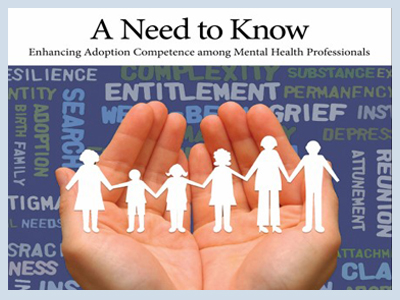by David M. Brodinsky PhD
The Donaldson Adoption Institute 2013
One of their most frequent complaints in adoption is the inability to find mental health care and ancillary service professionals who are adoption-competent – that is, who understand the unique issues associated with their histories and current lives, and how adoption can color or even shape their views of themselves, their identities and their relationships.
This point is reflected in a number of studies over time, including a recent survey on the experiences of adoptive families with mental health professionals (Atkinson, Gonet, Freundlich &, Riley, in press). Over 81 percent of the 485 respondents (84% of adoptive parents and nearly 77% of adopted persons) reported working with one or more mental health professionals. Of those who did, slightly fewer than 25 percent believed the professionals were adoption-competent; another 50 percent indicated some of the professionals were adoption-competent but others were not; and 26 percent said none of the mental health providers they saw knew much about adoption. Some respondents reported experiences with therapists that actually damaged their families.
Areas in which therapists were viewed as especially insensitive or lacking in adoption knowledge included attachment, trauma, loss and use of appropriate language. For a variety of reasons, mental health professionals typically do not receive the training required to fill adoption-related counseling needs and, too often, either do not fully understand why such training is necessary or mistakenly believe the knowledge they already have is sufficient. To address that reality, this report by the Donaldson Adoption Institute seeks to raise the level of awareness among mental health professionals about the nature and importance of adoption clinical competence, heighten their desire to receive such training, and identify various means by which the relevant knowledge and skills can be obtained.
Context and Primary Findings
Successful adoption is tied to good preparation of all parties prior to placement and to the availability and utilization of effective supports and other help, including counseling, afterward. Adoption-competent therapists are high on – and sometimes at the top of – the list of services that members of adoptive and birth families want and need.
- Genetic risk and early trauma (primarily for children adopted from foster care or institutions) do not inevitably undermine development. Two key factors that facilitate their recovery are comprehensive pre-adoption preparation and education of families, along with the availability and utilization of informed mental health services.
- Graduate education in relevant fields does not usually include adoption issues. A survey of directors of clinical training programs in marriage and family therapy, social work or counseling found only about 5-16 percent offered adoption-specific coursework. Twothirds of licensed psychologists in a national survey reported no such graduate coursework; fewer than one-third rated themselves as well or very well prepared to treat adoption issues, and 90 percent said psychologists need more adoption education.
- The limitations of medical insurance can pose significant barriers to accessing adoptioncompetent therapists. Most insurance doesn’t provide sufficient mental health coverage to cover the complex, long-term needs of those involved, particularly children who have suffered early trauma and other adversity; and few if any carriers take into account that adoption-competent therapists may not be on their lists of covered, in-plan providers.
- Which practitioners are adoption-competent is not always clear or easy to determine, in part because adoption counseling has not yet been identified as a professional specialty in the health care fields, with clear guidelines for training, practice and credentialing. Without an appropriate process, many individuals and families will continue to be treated by professionals who are inadequately prepared to understand and help them.
Download A Need to Know: Enhancing Adoption Competence Among Mental Health Professionals

